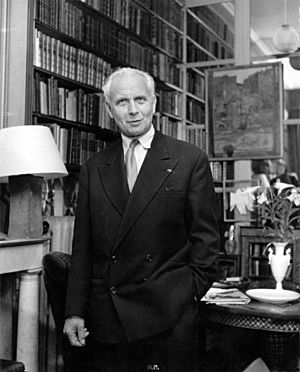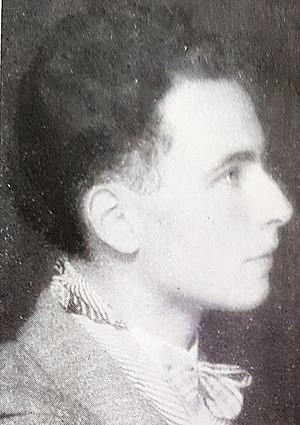Louis Aragon facts for kids
Louis Aragon (born 3 October 1897 – died 24 December 1982) was a famous French poet. He was a very important person in the Surrealist movement in France. Surrealism was an art and writing style that explored dreams and the imagination.
Aragon helped start a surrealist magazine called Littérature with his friends André Breton and Philippe Soupault. He was also a writer of novels and an editor. For many years, he was a member of the Communist Party. He was also part of the Académie Goncourt, a famous French literary group. After 1959, he was often suggested for the Nobel Prize in Literature.
Contents
Early Life and New Ideas (1897–1939)
Louis Aragon was born in Paris, France. He grew up believing his mother was his sister and his grandmother was his foster mother. His real father, Louis Andrieux, was a senator and much older than Aragon's mother. Aragon's mother told him that Andrieux was his godfather. Aragon only learned the truth when he was 19. This was just before he went to fight in World War I. His father's choice not to recognize him later affected Aragon's poetry.
From 1919 to 1924, Aragon was involved in Dada, another art movement that challenged traditional ideas. In 1924, he became a founding member of Surrealism. He joined with André Breton and Philippe Soupault, using the pen-name "Aragon."
In the 1920s, Aragon became interested in the French Communist Party (PCF). He officially joined the party in January 1927.
By 1933, he started writing for the party's newspaper, L'Humanité. He stayed a member of the Communist Party for his whole life. He wrote many political poems, including one for Maurice Thorez, the leader of the PCF.
Aragon sometimes criticized the USSR. This was especially true after 1956. At that time, the Soviet leader Nikita Khrushchev spoke out against Joseph Stalin's "personality cult." This meant Stalin was praised too much and seen as perfect. Aragon's wife, who was from Russia, also told him about problems in the Soviet Union.
The French surrealists admired Lewis Carroll, who wrote Alice in Wonderland. Aragon translated Carroll's poem The Hunting of the Snark in 1929.
The Commune Journal (1933–1939)
Besides writing for L'Humanité, Louis Aragon also became an editor for a journal called Commune. He worked with Paul Nizan. This journal was published by a group called the Association of Revolutionary Writers and Artists. Their goal was to bring together writers and artists to stand up against fascism, which was a dangerous political movement.
Aragon became a leader of the Commune journal in January 1937. Other important members included André Gide and Romain Rolland. The journal then focused on defending French culture through literature. As other leaders left or grew old, Aragon became the main director. The Commune journal played a big part in getting French thinkers to support the Spanish Republic during its civil war.
Leading Ce soir Newspaper (1937–1953)
In March 1937, the Communist Party asked Aragon to lead a new evening newspaper called Ce soir. He launched it with writer Jean-Richard Bloch. Ce soir tried to compete with another big newspaper, Paris-Soir. The newspaper was banned in August 1939.
After France was freed from German occupation, Ce soir reopened. Aragon became its leader again, first with Bloch and then alone. The newspaper closed in March 1953.
World War II and Resistance (1939–1945)
In 1939, Aragon married Elsa Triolet. She was a Russian-born author and the sister of Lilya Brik. Aragon had met Elsa in 1928, and she became a great inspiration for him. Aragon and Triolet worked together in French media that supported left-wing ideas. During World War II, they went into hiding for most of the German occupation of France.
Aragon joined the army in 1939. He received the Croix de guerre (War Cross) and a military medal for his bravery. After France's defeat in May 1940, he found safety in the southern part of France. He was one of many poets who joined the French Resistance. This meant he fought against the German occupation through his writing and by organizing secret activities.
The German governor, Otto Abetz, created "black lists" of authors. These lists banned books by Jewish people, communists, British or American writers, or anyone against Germany or fascism. Aragon and André Malraux were both on these forbidden lists.
During the war, Aragon wrote for secret underground newspapers like Les Éditions de Minuit. He was also part of the National Front Resistance movement. His poems were published in Switzerland in 1943. His friend and publisher François Lachenal secretly brought them out of occupied France.
Aragon and his wife helped create the National Front of Writers in southern France. This work caused him to break his friendship with Pierre Drieu La Rochelle, who chose to cooperate with the Germans.
After the war, Aragon, along with other poets like Paul Éluard, kept the memory of the Resistance alive in their poems. In 1954, he wrote Strophes pour se souvenir. This poem honored the role of foreigners in the Resistance. It celebrated a group called the FTP-MOI.
The poem was about the Red Poster affair. This was a famous event where a group of Resistance fighters, many of them immigrants, were captured and executed. The poem focused on the last letter written by Missak Manouchian, an Armenian-French poet and Resistance fighter, to his wife before he was executed in 1944. This poem was later turned into a song by Léo Ferré.
After the War
After France was freed, Aragon became a very important Communist thinker. He took on political roles in the National Committee of Writers. He praised the leader of the PCF, Maurice Thorez. He also supported the Communist group Kominform when it criticized the leader of Yugoslavia, Josip Broz Tito.
With Thorez's support, Aragon was elected to the central committee of the PCF in 1950. However, even this high position did not protect him from all criticism. For example, in March 1953, his journal Les Lettres françaises published a drawing by Pablo Picasso after Stalin's death. Some critics thought the drawing was disrespectful, and Aragon had to apologize. Over the years, his Russian-born wife told him about the harsh actions of Stalin's government. This caused his political views to change.
Les Lettres françaises (1953–1972)
After his newspaper Ce soir closed in 1953, Aragon became the director of L'Humanité's literary section, Les Lettres françaises. In the 1960s, Aragon began to fight against Stalinism and its effects in Eastern Europe. He published writings by people who disagreed with the government, like Aleksandr Solzhenitsyn and Milan Kundera. Les Lettres françaises lost money, so it stopped publishing in 1972. It was later restarted.
In 1956, Aragon supported the Budapest uprising. This caused the National Committee of Writers to break up. However, in the same year, he received the Lenin Peace Prize. He strongly criticized the Soviet Union's harsh rule. He opened his magazines to writers who spoke out against the government. He also condemned unfair trials against thinkers, like the 1966 Sinyavsky-Daniel trial. He strongly supported the student protests of May '68 in France. When the Soviet Union crushed the Prague Spring in 1968, he wrote a critical introduction for a translation of one of Milan Kundera's books. Despite his criticisms, Aragon remained an official member of the Communist Party's central committee until he died.
As a Publisher
Besides his work as a journalist, Louis Aragon was also the head of a publishing house called Editeurs français réunis (EFR). This company continued the work of two publishing houses started by the Resistance. In the 1950s, he published French and Soviet writers who followed the "Socialist Realism" style. This style showed life in a way that supported communist ideas.
The EFR published many works, including Premier choc by André Stil, which won the Stalin Peace Prize in 1953. They also published other writers like Julius Fučík, Rafael Alberti, and Vladimir Mayakovsky. In the early 1960s, the EFR started publishing works by non-Russian Soviet writers, like Tchinguiz Aïtmatov. They also published Russian writers who were part of the Khrushchev Thaw, a time when there was more freedom of expression. This included Yevgeny Yevtushenko's Babi Iar in 1967. The EFR also published the first novel by Christa Wolf in 1964. They launched a poetry collection that included works by Pablo Neruda and Eugène Guillevic.
Return to Surrealism
After he was no longer married and had stopped publishing Les Lettres Françaises in 1972, Aragon was free to go back to his surrealist roots. In the last ten years of his life, he published at least two more novels: Henri Matisse Roman and Les Adieux.
Louis Aragon passed away on 24 December 1982. He was buried in the park of Moulin de Villeneuve, at his home in Saint-Arnoult-en-Yvelines. He rests there next to his wife, Elsa Triolet.
Aragon was, and still is, a very popular poet in France. Many of his poems have been turned into songs by different composers and singers. These include Léo Ferré, Jean Ferrat, Georges Brassens, and Isabelle Aubret. Léo Ferré was the first to release an entire album of Aragon's poems set to music in 1961. Some of his poems, set to music by Jean Ferrat, have even been translated into German.
See also
 In Spanish: Louis Aragon para niños
In Spanish: Louis Aragon para niños
- Le Monde's 100 Books of the Century, a list which includes Aurélien
- Category:Works by Louis Aragon
 | Bessie Coleman |
 | Spann Watson |
 | Jill E. Brown |
 | Sherman W. White |



